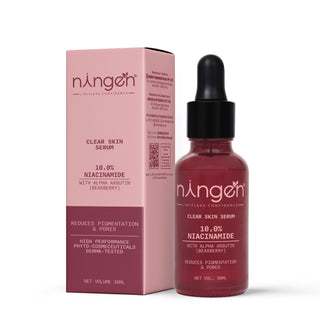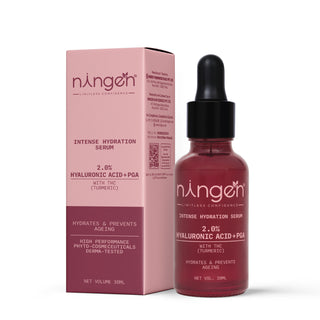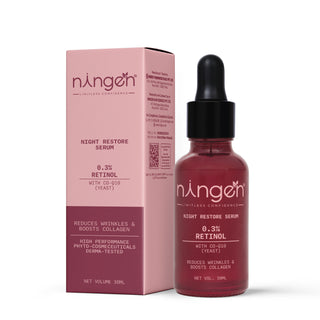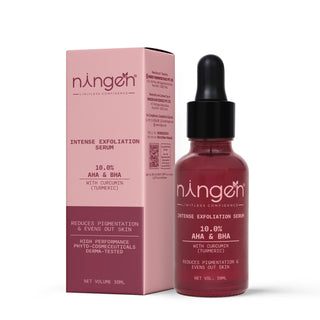As the seasons change and spring approaches, we must adapt our skincare routines to keep our skin healthy and glowing. With the transition from colder, drier winter weather to warmer, more humid conditions, our skin's needs evolve. To ensure that your skin remains radiant and well-nourished during this time, we've compiled nine essential tips to help you navigate the spring season with confidence.
In this blog, we'll explore nine essential tips to help you keep your skin healthy and glowing during the spring season.
From adjusting your cleansing routine to protecting your skin from increased sun exposure, these tips will guide you toward achieving a vibrant complexion that's ready to bloom along with the flowers of spring.
Why Does The Spring Season Need Extra Skincare?
The spring season often necessitates extra skincare due to several factors:
Changing Weather Conditions: Spring transitions from winter to summer, bringing fluctuating temperatures, increased humidity, and variable weather conditions. These changes can affect the skin's moisture levels and overall health.
Allergens: Springtime is notorious for allergens such as pollen, dust, and mold, which can trigger allergic reactions and sensitivities in the skin. Allergic reactions may lead to inflammation, redness, and other skin issues.
Increased Sun Exposure: As the days get longer and the sun's intensity rises, there is greater exposure to harmful UV rays. Prolonged sun exposure without adequate protection can lead to sunburn, premature aging, and an increased risk of skin cancer.
Dryness: While winter is typically associated with dry air, spring can also be dehydrating for the skin, especially as humidity levels fluctuate. Dry air combined with increased outdoor activities can result in moisture loss and dry skin.
Pollution: With more outdoor activities and increased urbanization, exposure to air pollution becomes more prevalent in spring. Pollutants such as particulate matter and toxins can accumulate on the skin's surface, leading to clogged pores, dullness, and accelerated aging.
Spring Cleaning: Many people engage in spring cleaning activities, which may involve exposure to harsh cleaning chemicals and irritants. Contact with these substances can strip the skin of its natural oils and disrupt its protective barrier.
Seasonal Allergies: Spring is synonymous with seasonal allergies, which can manifest as skin issues such as eczema, hives, and contact dermatitis. Itchy, irritated skin is common during allergy season and requires special care.
Transitioning Skincare Routines: As the weather changes, so should your skincare routine. Products that worked well during winter may no longer be suitable for spring. Adjustments in skincare routines are necessary to address changing skin needs.
Preparation for Summer: Spring skincare lays the groundwork for healthy skin during the upcoming summer months. By addressing any skin concerns and maintaining a consistent skincare regimen in spring, you can better prepare your skin for the challenges of summer, such as increased sun exposure and higher temperatures.
9 Tips To Take Care Of Your Skin In Spring
As the weather warms up and flowers bloom, it's time to transition our skincare routines to adapt to the changing seasons. Spring brings its own set of challenges and opportunities for skincare, from adjusting to increased humidity to protecting against sun exposure. To keep your skin glowing and radiant this spring, here are nine essential tips for effective skincare:
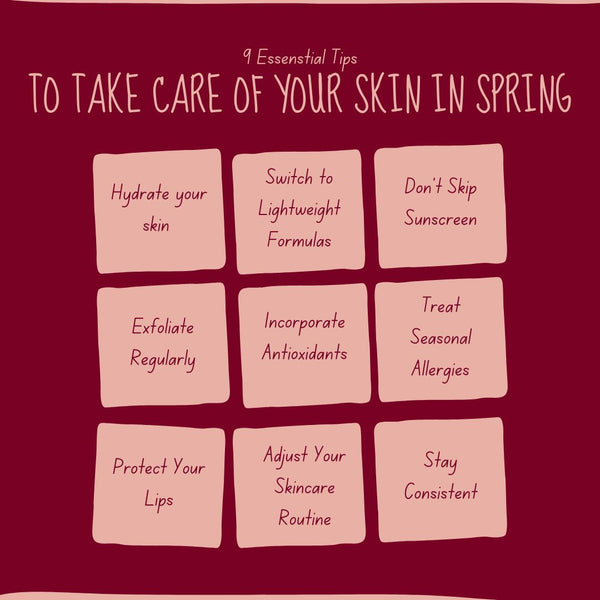
Hydrate, Hydrate, Hydrate:
With the arrival of spring, higher temperatures and increased outdoor activities can lead to dehydration. Ensure you're drinking plenty of water throughout the day to keep your skin hydrated from the inside out. Aim for at least eight glasses of water daily to maintain optimal hydration levels.
Switch to Lightweight Formulas:
Bid farewell to heavy winter creams and opt for lighter, water-based moisturizers and serums. Lightweight formulas are absorbed quickly by the skin, providing essential hydration without leaving a greasy residue. Look for products labeled "oil-free" or "non-comedogenic" to prevent clogged pores.
Don't Skip Sunscreen:
As the sun becomes stronger in spring, it's crucial to protect your skin from harmful UV rays. Apply a broad-spectrum sunscreen with SPF 30 or higher every morning, even on cloudy days. Reapply sunscreen every two hours, especially if you're spending extended periods outdoors.
Exfoliate Regularly:
Winter's chill may have left your skin feeling dry and dull. Exfoliation helps slough off dead skin cells, revealing smoother, brighter skin underneath. Choose a gentle exfoliant suitable for your skin type and use it 2-3 times per week to maintain a healthy complexion.
Incorporate Antioxidants:
Antioxidants play a vital role in protecting the skin from environmental damage and premature aging. Add products rich in antioxidants, such as vitamin C serums or green tea extracts, to your skincare routine. These potent ingredients help neutralize free radicals and promote skin repair.
Treat Seasonal Allergies:
Spring allergies can wreak havoc on your skin, causing irritation, redness, and inflammation. Manage allergy symptoms with antihistamines or allergy medications as recommended by your healthcare provider. Additionally, soothe irritated skin with gentle, fragrance-free skincare products.
Protect Your Lips:
Don't forget to give your lips some TLC this spring. The transition from cold, dry winter air to warmer temperatures can leave lips feeling chapped and dry. Keep your lips hydrated and protected by applying a moisturizing lip balm with SPF throughout the day.
Adjust Your Skincare Routine:
As the weather changes, your skin's needs may evolve as well. Pay attention to how your skin responds to seasonal shifts and adjust your skincare routine accordingly. You may need to introduce new products or modify existing ones to address specific concerns.
Stay Consistent:
Consistency is key to achieving and maintaining healthy skin. Establish a daily skincare routine that incorporates cleansing, moisturizing, and sun protection. Stick to your regimen diligently, even on busy days or when you're tempted to skip steps.
Which Skincare Ingredients Help In Spring And Why?
Skincare ingredients play a vital role in helping your skin adapt to the changing environmental conditions during the spring season. Here are several ingredients that can be particularly beneficial during this time and why:
Hyaluronic Acid: Spring weather often brings fluctuations in humidity levels, which can lead to dehydration and dryness in the skin. Hyaluronic acid is a humectant that attracts and retains moisture, helping to keep the skin hydrated and plump.
Vitamin C: With increased sun exposure during the spring months, the skin is more susceptible to damage from UV radiation and free radicals. Vitamin C is a powerful antioxidant that helps protect the skin from environmental stressors, brightens the complexion, and promotes collagen production for firmer, more resilient skin.
Glycolic Acid: As the weather warms up, exfoliation becomes essential to remove dead skin cells and unclog pores. Glycolic acid is an alpha hydroxy acid (AHA) that exfoliates the skin, leaving it smoother, brighter, and more radiant.
Niacinamide (Vitamin B3): Niacinamide helps regulate sebum production, making it particularly useful for balancing oily or acne-prone skin during the spring months. It also strengthens the skin's barrier function, reducing moisture loss and protecting against environmental damage.
Antioxidants: Ingredients like green tea extract, resveratrol, and coenzyme Q10 help neutralize free radicals generated by UV radiation and pollution. Using antioxidant-rich skincare products can help prevent premature aging, inflammation, and other signs of environmental damage.
Squalane: With the transition to warmer weather, lighter moisturizers are often preferred to avoid feeling heavy or greasy on the skin. Squalane is a lightweight moisturizing ingredient derived from olives that helps hydrate and nourish the skin without clogging pores.
Peptides: Peptides are amino acid chains that support collagen synthesis and improve skin elasticity. Incorporating peptides into your skincare routine can help maintain firm, youthful-looking skin as you transition into spring and beyond.
By incorporating these skincare ingredients into your routine, you can help protect and nourish your skin as it adjusts to the changing conditions of the spring season.
Discover our thoughtfully curated collection of skincare products for the spring season. Explore the carefully chosen items featured in the dedicated section below.
Wrapping Up
Hope you find our article on 9 Essential tips to take care of your skin in spring useful. By following these nine tips, you can ensure your skin stays healthy, hydrated, and radiant throughout the spring season. Remember to listen to your skin's needs, stay vigilant with sun protection, and confidently embrace the season's beauty!
Get confident skin throughout the spring and beyond.
Frequently Asked Questions
Question 1: Why is skincare important in spring?
Answer: Spring brings changes in weather and environmental factors, making skincare essential to protect and nourish your skin.
Question 2: How does spring weather affect the skin?
Answer: Spring weather can lead to increased humidity, UV exposure, and pollen, which may cause skin dryness, sun damage, and allergies.
Question 3: What are some common skin concerns in spring?
Answer: Common skin concerns in spring include dryness, sunburn, allergies, and breakouts due to changing weather conditions and environmental factors.
Question 4: How can I protect my skin from sun damage in spring?
Answer: Use sunscreen with SPF, wear protective clothing, and seek shade during peak sun hours to prevent sunburn and skin damage.
Question 5: How do I keep my skin hydrated in spring?
Answer: Stay hydrated by drinking plenty of water, use moisturizers with hydrating ingredients, and avoid hot showers that can strip the skin of moisture.
Question 6: What skincare ingredients are beneficial for spring?
Answer: Look for hydrating ingredients like hyaluronic acid, lightweight moisturizers, antioxidant-rich serums, and gentle exfoliants to refresh and nourish the skin.
Question 7: How often should I exfoliate my skin in spring?
Answer: Exfoliate 1-2 times per week to remove dead skin cells, unclog pores, and promote cell turnover, revealing smoother and brighter skin.
Question 8: Can allergies affect the skin in spring?
Answer: Yes, seasonal allergies can lead to skin irritation, redness, and inflammation, especially for those with sensitive skin.
Question 9: How can I adjust my skincare routine for spring?
Answer: Transition to lighter skincare products, incorporate SPF into your daily routine, and address specific concerns like allergies or increased oiliness with targeted treatments.
Question 10: What else can I do to maintain healthy skin in spring?
Answer: Practice good skincare habits like cleansing twice daily, eating a balanced diet, getting enough sleep, and managing stress to promote overall skin health during the spring season.




